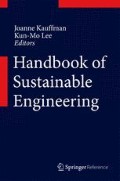Abstract
From the point of view of sustainability as well as an economic perspective, business planning, monitoring, evaluation, and communication with customers and a wide variety of other stakeholders are becoming more and more important. In this context, a growing number of methods and tools for sustainable product and business design are proposed. Examples include design for environment (DfE), product service system (PSS), industrial product service system (IPSS), servicizing, function selling, service engineering, life cycle assessment (LCA), and life cycle simulation (LCS) methods.
However, it is often difficult to determine business activities that actually contribute to or harm the sustainability of the earth due to complexity of the cause-effect chains observed in business activities among stakeholders. Rebound effects typically show such indirect causality; for instance, the development of fuel-efficient vehicles may contribute to the reduction of energy consumption from a systemic perspective. However, the development sometimes increases energy consumption, because users of these vehicles may be less aware of the environmental loads of driving activities and drive more in consequence. Furthermore, governmental subsidies that stimulate the market introduction of these vehicles may result in the purchasing power of the potential owners in a long term.
In such a case, it is crucial to configure the business economically and environmentally feasible in a long term by introducing new activities (e.g., introduction of a user incentive scheme regarding the reduction of energy consumption) accompanied with energy-efficient technologies. Consideration of such direct and indirect influences of the development of energy-efficient technology on business activities in multiple time scales, and vice versa, is indispensable for idea generation of eco-business.
Although LCS and LCA can analyze both direct and indirect influences of business activities in a long term if they are appropriately represented in the numerical models, they are not sufficient for idea generation of eco-business. To support the idea generation of eco-business, study on modeling methods dealing with indirect causalities in a systematic and comprehensive manner is inevitable. Collection of a variety of cause-effect patterns observed in the existing eco-business cases and utilization of these patterns at the idea generation process is a basis of such study.
The objective of this chapter is to propose an idea generation method for eco-business planning that handles complex relations among business activities among stakeholders from multiple time scales. Firstly, cause-effect patterns in a successful eco-business models and cases, including IPSS and function selling, are identified and formulated into cause-effect pattern library focusing on the gaps between the condition of each successful case and those of conventional businesses. Causal-loop diagram (CLD), which is a kind of system dynamics tool, is utilized to describe the gaps. Then, using information contained in the library, an idea generation procedure of eco-business is illustrated with a simplified “EcoFleet” business. Finally, future development needs of the proposed method are also discussed.
This chapter is prepared for all business planners and product designers who wish to make their product and service more environmentally friendly. Any specific knowledge in engineering design are not necessary to read through this chapter.
Access this chapter
Tax calculation will be finalised at checkout
Purchases are for personal use only
References
Association for ESCO Business Introduction in Japan, Committee report for ESCO business introduction in Japan, Energy Conservation Centre Japan (1998)
Ecologicom (2012), http://www.ecologicom.com/first/index.htm. Accessed 25 May 2012
M.Z. Hauschild et al., Life cycle design. A route to the sustainable industrial culture? Ann. CIRP 48(1), 93–96 (1999)
R. Karl-Henrik, Tools and concepts for sustainable development, how do they relate to a general framework for sustainable development, and to each other? J. Clean. Prod. 8, 243–254 (2000)
K. Kobayashi, T. Kumazawa, A simulation-based decision support methodology for reuse business, in Proceedings of Eco-Design 2005, 3A-1-2F (CD-ROM), Tokyo, 2005
S. Kondoh, N. Mishima, Case based idea generation method for eco-businesses, in Proceedings of the 3rd CIRP Conference on Industrial Product Service System, Braunschweig (Springer, New York/Berlin/Heidelberg, 2011), pp. 69–74
S. Kondoh, K. Kurakawa, S. Kato, Y. Umeda, S. Takata, Analysis of key success factors for eco-business through case studies in Japan, in Proceedings of 13th CIRP International conference on Life Cycle Engineering, Leuven, 2006, pp. 275–280
S. Kondoh, K. Masui, M. Hattori, N. Mishima, M. Matsumoto, Total performance analysis of product life cycle considering the deterioration and obsolescence of product value. Int. J. Prod. Dev. 6(3/4), 334–352 (2008)
S. Kondoh, T. Tateno, M. Matsumoto, Multi-agent simulation of component reuse focusing on variations in user preference. CIRP J. Manuf. Sci. Technol. 1, 287–293 (2009)
M. Lindahl, G. Olundh, The meaning of functional sales, in Proceedings of the 8th CIRP International Seminar on Life Cycle Engineering, Varna, 2001, pp. 211–220
H. Meier et al., Industrial product-service systems—IPS2. CIRP Ann. Manuf. Technol. 59, 607–627 (2010)
Press release of Green Power Certification Council (2001), http://eneken.ieej.or.jp/greenpower/eng/temp/04/01.pdf
J. Puckett et al., Exporting harm (2002), http://www.ban.org/E-waste/technotrashfinalcomp.pdf. Accessed 25 May 2012, Basel Action Network
J.D. Sterman, Business Dynamics (McGraw-Hill, Boston, 2000)
Y. Umeda et al., Study on life-cycle design for the post mass production paradigm. AIEDAM 14(2), 149–161 (2000)
Y. Umeda et al., Proposal of sustainable society scenario simulator. CIRP J. Manuf. Sci. Technol. 1(4), 272–278 (2009)
UNEP, Ecodesign: A Promising Approach to Sustainable Product and Consumption (United Nations Publication, Paris, 1997)
W. Wimmer et al., Ecodesign Implementation (Springer, Dordrecht, 2004)
Author information
Authors and Affiliations
Editor information
Editors and Affiliations
Rights and permissions
Copyright information
© 2013 Springer Science+Business Media Dordrecht
About this entry
Cite this entry
Kondoh, S., Komoto, H. (2013). Eco-business Planning: Idea Generation Method. In: Kauffman, J., Lee, KM. (eds) Handbook of Sustainable Engineering. Springer, Dordrecht. https://doi.org/10.1007/978-1-4020-8939-8_61
Download citation
DOI: https://doi.org/10.1007/978-1-4020-8939-8_61
Publisher Name: Springer, Dordrecht
Print ISBN: 978-1-4020-8938-1
Online ISBN: 978-1-4020-8939-8
eBook Packages: EngineeringReference Module Computer Science and Engineering

